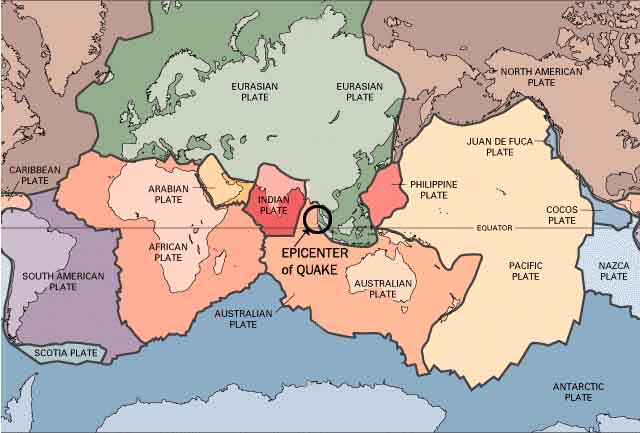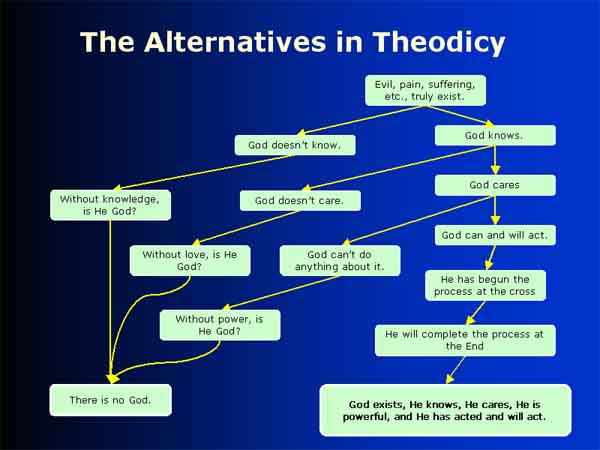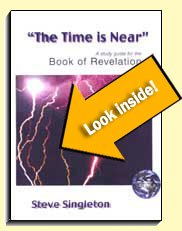
The powerful tsunami that on Dec. 26, 2004, hit the lands in and
surrounding the Indian Ocean, the Bay of Bengal, and the South China Sea
[see this UNESCO animation] caused terrible devastation and
immediate loss of thousands of lives, followed by an aftermath in which
tens of thousands more perished. [View videos] The earthquake-triggered tsunami has
prompted people all over the world to ask themselves and others, "Where
was God when this happened? Did He fall asleep? Is He even real?"
Sometimes, what we call disasters is just a part of God's organization
of nature; humans are merely in the wrong place at the wrong time. In
Ecclesiastes 9:11–12, wise King Solomon
observes: Moreover, no man knows when his hour will
come: The 12/26/04 tsunami seems to fall into this category. People were
killed with no discrimination with regard to race, creed, class, or
religion. If God had a purpose in the tsunami, it remains obscure to me.
You will hear some Christians deny that events happen by chance because
they think that this means God has released His grip on the controls of
the universe. But according to this passage, some disasters just happen.
This is not because God has no control but
because He has constructed the universe in such a way that an unbroken
chain of causes and effects will take place according to the physical laws
He has established unless He intervenes. In the case of the tsunami, its
cause was an extremely powerful undersea earthquake. The earthquake in
turn was caused by the shifting of tectonic plates. The plates are all the
building blocks of the earth's crust, designed to interact in this way.
Earthquakes happen all over the world. Those that happen in or near the
earth's oceans sometimes cause tsunamis.
Many Christians and Jews believe that such catastrophes are part of
nature's participation in the Fall: as a result of the sin of Adam and
Eve, the ground began to bear thorns instead of abundant produce, the pain
of childbearing increased, work became toil, and death became the constant
companion of humanity. By extension, we could easily deduce that typhoons
and tornadoes, mudslides and avalanches, earthquakes and tsunamis are all
the result of the Fall--that the moral rebellion of the First Couple
fractured the pre-Fall cosmic harmony. As Paul says in Romans 8:20:
"Creation was subjected to frustration, not by its own choice, but by the
will of the One who subjected it."
One way of explaining it is to compare the Fall to a broken gear in a
printing press: the entire complicated system of interconnected gears,
wheels, and pulleys has to be adjusted to allow for the missing teeth in
one gear. So it is with the universe--it has been adjusted to our
brokenness. It doesn't run as smoothly as it would have if human rebellion
had not "thrown a monkey wrench" into the machinery of the cosmos.
As difficult as it is for us to accept emotionally, the Bible affirms
that God sometimes causes natural disasters. In Isaiah 45:5 and 7, the
LORD confronts Cyrus:
I am the LORD, and there is no
other; Cyrus was probably a Zoroastrian, In Amos 4:6–13, for example, the LORD explains His
purpose in releasing one disaster after another upon Israel:
I gave you empty stomachs in every
city "I also "Many times I struck your gardens and
vineyards, "I sent plagues among you as I did to
Egypt. "I overthrew some of you as I overthrew Sodom and
Gomorrah. "Therefore this is what I will do to you,
Israel, He who forms the mountains, creates the
wind, Sometimes, however, God's purpose is only to punish the wicked, as in
the Great Flood (Gen. 6:13, 17) and the great hail God rained down on the
Amorites (Josh. 10:11). In the bowls of wrath revealed in Revelation
chapter 16, God makes no allowance for repentance. Many scholars are
convinced that John's vision symbolizes this by stating that no one is
allowed into heaven's temple until the bowls of wrath have all been poured
out, making it impossible to intercede and make atonement for the sinners
(Rev. 15:8; compare Num. 16:46–50; 2 Sam. 24:15–25; Jer. 7:9–20).
When such punishing disasters take place, the righteous are sometimes
spared, as in the case of several of the plagues against Egypt (Exod.
8:22–23; 9:3–7, 23–26; 10:22–23; 11:4–7; 12:12–13, 28–30). On other
occasions, however, the righteous suffer right along with the wicked.
Consider, for example, the Habakkuk's dialogue with God about the wicked
among his people. In answer to Habakkuk's complaint, the LORD promises to send the Babylonians against his people
(1:5-11). In response, the prophet asks (Hab. 1:13):
Your eyes are too pure to look on
evil; In vv. 14-16, Habakkuk says the wicked Babylonians catch and kill
people like fishermen. It is like they gather nations in their dragnet; no
one escapes. Then they celebrate and worship their "net" as a god. Then
Habakkuk asks (v. 17), "Is he to keep on emptying his net, destroying
nations without mercy?"
The answer comes back that God understands how wicked they are
(2:1–19). He concludes with the reassuring affirmation: "The LORD is in His holy temple. Let all the earth be silent
before Him" (2:20). In other words, God is saying, "Habakkuk, you're just
going to have to trust Me on this one. Even though disasters happen that
you don't understand, I'm still on the throne. I still rule the universe."
Habakkuk's response is commendable. After describing his fearful
witnessing of the LORD's wrath, he recommits himself
to trusting Him:
I heard and my heart
pounded, Though the fig tree does not
bud The Sovereign LORD is my
strength; That's the kind of response we must have when we witness catastrophes
like the tsunami of December 26, 2004. We can acknowledge that we don't
understand why God would allow such a thing to happen, but at the same
time recognize that we are so limited in our perspective compared to the
Eternal One. He has proven Himself faithful over a thousand generations,
and we can trust that He "does not change like shifting shadows" (James
1:17).
The righteous can be sure of this: God has not forgotten them and has
promised to guide all events—even horrendous natural disasters—for their
ultimate good (Rom. 8:28–29). His purpose for us is to use the things that
happen to us to transform us into the image of His Son, Jesus Christ. If
He accomplishes that, with our willing cooperation, anything else that
happens to us is worth it. Paul reasons, "I consider that our present
sufferings are not worth comparing with the glory that will be revealed in
us" (Rom. 8:18), and he writes this:
Nor is Paul only referring to persecutions; natural calamities fall
within his scope, as his laundry list of sufferings in Second Corinthians
11:23-29 demonstrates.
The wicked have no such hope. If disaster overtakes them, they can only
despair (Ps. 73:18–20; Isa. 57:20–21). If they survive, their grief over
their losses can prove inconsolable (1 Thess. 4:13). Disasters that should
draw them toward God may only harden their hearts as they resist the pull
(see Exod. 8:15, 32; Rev. 9:20–21).
When we witness a disaster that falls on others, we should approach God
in prayer on their behalf and do what we can to lend aid. When we
experience one ourselves, we should run to Him for rescue, for aid, and
for consolation. God can use a terrible disaster to bring about a wondrous
good in someone's life. The cross is proof enough of that.
Want to go deeper?
Theologians and other intellectuals have wrestled with this issue for
centuries. The basic problem is Christianity (for one) teaches that: 1)
God is inifinitely powerful; 2) God knows everything; 3) God is infinitely
good and loving toward human beings; and 3) evil exists. The challenge is
in explaining how all four can be simultaneously true. Everyone agrees
that 3) is true. Does God know about evil and care about the harm it
causes human being, but is not powerful enough to destroy evil? Or does He
have the knowledge of evil and the power to overcome it but doesn't care?
Or does He care about what happens to us and has the power to stop evil,
but is not aware of the problem? Efforts to explain this problem fall
under the term "Theodicy" (which means "Justifying God").
The atheist believes that this is one of the strongest arguments
against the existence of God. The existence of evil is proof that God, at
least at defined according to the Judaeo-Christian Scriptures, cannot
exist, atheists claim.
Christians have made two responses--soul-building and free will--and
the fundamental principles of these two responses were laid down by the
early Christian church leaders Irenaeus and Augustine, respectively.
In his work, Against Heresies (4.37–41), Irenaeus taught that God permits the
existence of evil as a necessary component for the making of souls. To
teach human beings to choose good instead of evil, evil had to exist. But
when they pursue the evil instead of God who calls them, their sin is not
God's fault but theirs. (In modern times, philosopher/theologian John Hick
in his Evil and the God of Love [New York: Harper & Row, 1966],
has expanded this argument, reaching the unbiblical conclusion that
ultimately all human beings will be drawn into God's kingdom.)
In his Treatise on Grace and Free Will (chapter 3), Augustine explains how God had to permit
evil in order to endow his human creatures with the gift of free will. For
Him to give us free will is a greater good than forcing us all to be His
robots.
A third response we can call "End-time resolution." Our current
situation, in which evil still exists and mishaps fall on both the
righteous and the unrighteous, is only an instant in the human history
that stretches into eternity. We therefore cannot conclude that the
present situation is the permanent one; in the cross of Christ and the
empty tomb, God has defeated the powers of darkness--including evil,
catastrophes, and suffering. They are all only temporary, and at the end
of time, at the dawn of "the new heavens and new earth" (2 Peter 3:13; 1
Cor. 15:24–28, 50–57), God will sweep all three away forever. "The creation itself will be liberated from its bondage to decay and
brought into the glorious freedom of the children of God" (Rom. 8:20–21).
Once God completes his mysterious and sometime inscrutable purposes with
evil, pain, disasters, and suffering, they will be no more.
Other resources:
Lactantius, Treatise on the Anger of God, Chapter 13.
1940 Lewis, C. S. The Problem of Pain. London &
New York: Macmillan. Reprinted
many 1972 Warren, Thomas B. Have Atheists Proved There is no
God? Nashville, TN:
Gospel 1980 Gerstenberger, Erhard S., and Schrage, Wolfgang.
Suffering. Transl. John
E. 1982 Boyce, M. "Ahura Mazda," 684–687 in Encyclopaedia
Iranica. Ed. Ehsan
Yarshater. 1984 Feinberg, John S. "Theodicy," 1083-1086 in
Evangelical Dictionary of Theology.
Ed. 1993 McGrath, Alister E. Intellectuals Don't Need God
& Other Modern Myths:
Building 1995 Rush, Terry. God Will Make a Way. West Monroe,
LA: Howard. See especially
part 1997 Jones, Jerry. Beyond the Storm: Finding God's Calm
Assurance. West Monroe,
LA: 2002 Murphy, Gannon. "God
and the Problem of Evil." Minnesota Apologetics Project. Free offers from earlier issues (for 5 new subscribers):

I have seen something else under the
sun:
The race is not to the
swift
or the battle to the
strong,
nor does food come to the
wise
or wealth to the
brilliant
or favor to the
learned;
but time and chance happen to
them all.
As fish are caught in a cruel
net,
or birds are taken in a
snare,
so men are trapped by evil
times
that fall unexpectedly upon
them.

apart from me there is no
God....
I form the light and create
darkness,
I bring prosperity and create
disaster;
I, the LORD, do all
these things.
 believing in two gods— one called Ahura Mazda, who is
perfectly good and brings blessings to the world, and his twin brother,
Angra Mainyu or Ahriman, infinitely evil and bringing the world
believing in two gods— one called Ahura Mazda, who is
perfectly good and brings blessings to the world, and his twin brother,
Angra Mainyu or Ahriman, infinitely evil and bringing the world  trouble. But the LORD God claims to be the sole deity of the universe. Some
disasters happen due to God's permissive will, as is the case with the
calamities that befell Job (Job 1:18–19). Others come in response to God's
positive command for the purpose of punishing the wicked and motivating
people to repent.
trouble. But the LORD God claims to be the sole deity of the universe. Some
disasters happen due to God's permissive will, as is the case with the
calamities that befell Job (Job 1:18–19). Others come in response to God's
positive command for the purpose of punishing the wicked and motivating
people to repent.
and lack of bread in every
town,
yet you
have not returned to me," declares the LORD.
 withheld rain from you
withheld rain from you
when
the harvest was still three months
away.
I sent rain on one town, but
withheld it from another.
One field had
rain; another had none and dried
up.
People staggered from town to town
for water
but did not get enough to
drink,
yet you
have not returned to me," declares the LORD.
I struck them with blight and
mildew.
Locusts devoured your fig and
olive trees,
yet
you have not returned to me," declares the LORD.
I killed your young men with the
sword,
along with your captured
horses.
I filled your nostrils with the
stench of your
camps,
yet you
have not returned to me," declares the LORD.
You were like a burning stick
snatched from the
fire,
yet you
have not returned to me," declares the LORD.
and because I will do this to
you,
prepare to meet your God, O
Israel."
and reveals his thoughts to
man,
he who turns dawn to
darkness,
and treads the high places of
the earth—
the
LORD God Almighty is his name.
 A similar thing happens in
Revelation, chapters 8 and 9. The natural disasters pictured by the
trumpets seem to stand for a wide range of ways that God can use to prompt
the wicked to repent. In this case, however, they stubbornly refuse: "The
rest of mankind that were not killed by these plagues still did not repent
of the work of their hands; they did not stop worshiping demons, and idols
of gold, silver, bronze, stone and wood–idols that cannot see or hear or
walk. Nor did they repent of their murders, their magic arts, their sexual
immorality or their thefts" (Rev. 9:20-21).
A similar thing happens in
Revelation, chapters 8 and 9. The natural disasters pictured by the
trumpets seem to stand for a wide range of ways that God can use to prompt
the wicked to repent. In this case, however, they stubbornly refuse: "The
rest of mankind that were not killed by these plagues still did not repent
of the work of their hands; they did not stop worshiping demons, and idols
of gold, silver, bronze, stone and wood–idols that cannot see or hear or
walk. Nor did they repent of their murders, their magic arts, their sexual
immorality or their thefts" (Rev. 9:20-21).
you cannot tolerate
wrong.
Why then do you tolerate the
treacherous?
Why are you silent while the wicked
swallow up
those more righteous than
themselves?
my lips quivered at the  sound;
sound;
decay
crept into my bones,
and my legs
trembled.
Yet I will wait patiently for the day of
calamity
to come on the nation invading
us.
and there are no grapes on the
vines,
though the olive crop
fails
and the fields produce no
food,
though there are no sheep in the
pen
and no cattle in the
stalls,
yet I will rejoice in the LORD,
I will be joyful in
God my Savior.
he makes my feet like the feet
of a deer,
he enables me to go on the heights.
Therefore we do not lose heart. Though outwardly we are wasting
away, yet inwardly we are being renewed day by day. For our light and
momentary troubles are achieving for us an eternal glory that far
outweighs them all. So we fix our eyes not on what is seen, but on what
is unseen. For what is seen is temporary, but what is unseen is eternal.
— 2 Cor. 4:16–18

times since 1940.
Advocate. This
is a revision of the last chapter of Warren's doctoral dissertation
at
Vanderbilt.
Steely. Nashville,
TN: Abingdon. Explores suffering throughout the Old
and
New Testaments.
Read online (Adobe Acrobat document)
Walter A. Elwell.
Grand Rapids: Baker.
Bridges to
Faith Through Apologetics. Grand Rapids: Zondervan. 100-108.
3: "Pain's Joy."
Howard. See
especially chapter 8: "Why must we suffer?"

Racism: The Ongoing Challenge—Qualify for this free
e-booklet! When is the last time you
heard a sermon or read anything against racism from a biblical viewpoint?
This nine-page e-booklet discusses what the Bible teaches about racism,
including a refutation of the argument that Africans are under Noah's
curse. This is clear, biblical teaching about race relations, equality in
Christ, and what Christians should do about racism. Just send us the
e-mail addresses of five friends who could benefit from receiving a free
subscription to DeeperStudy Newsletter.
Claim your e-booklet, Racism:
The Ongoing Challenge today!
When is the last time you
heard a sermon or read anything against racism from a biblical viewpoint?
This nine-page e-booklet discusses what the Bible teaches about racism,
including a refutation of the argument that Africans are under Noah's
curse. This is clear, biblical teaching about race relations, equality in
Christ, and what Christians should do about racism. Just send us the
e-mail addresses of five friends who could benefit from receiving a free
subscription to DeeperStudy Newsletter.
Claim your e-booklet, Racism:
The Ongoing Challenge today!

You've heard opinions and theories about the meaning of 666, some from respected Christian friends, and some from the tabloids. I wrote this full-length e-book to help you sort the far-fetched speculations from the real possibilities. Now you can own this thoroughly researched, thoroughly documented study of the meaning of 666 for only $9.95. And because it's an e-book, you save all the shipping cost! Get you copy today!
 You still have
time!
You still have
time!As you may have seen on DeeperStudy.com, the third edition of Overcoming, my study guide for Revelation, is selling for $39.95. But we still have a few copies of the second edition, called The Time is Near! It is 279 pages and is the same as the 3rd edition, including the 65-page introduction, over 100 charts, the special 50-page section on the hermeneutics of the "Left Behind" series, and a scripture index to spiritual songs based on Revelation, but without the additional material on chapters 2 and 3. This is a bargain at only $24.95 plus shipping! This offer is good only while our supplies last, so hurry!
The popular novels by Tim LaHaye and Jerry B. Jenkins assume
 the truth of an understanding of end-time events known as
Dispensational Premillennialism. It's certainly popular, but is it right?
This full-length e-book (50 8-1/2"x11" pages) examines LaHaye and Jenkins'
treatment of the end-time prophecies in the light of Bible interpretation
errors to which all Bible students are prone. You don't want to pass up
this in-depth study.
the truth of an understanding of end-time events known as
Dispensational Premillennialism. It's certainly popular, but is it right?
This full-length e-book (50 8-1/2"x11" pages) examines LaHaye and Jenkins'
treatment of the end-time prophecies in the light of Bible interpretation
errors to which all Bible students are prone. You don't want to pass up
this in-depth study. rights
reserved. [Our
privacy policy]
rights
reserved. [Our
privacy policy]
Take our new survey!We want to know what you think about DeeperStudy. Please take a moment to complete our anonymous eight-question survey.Results will be posted in the next issue of DeeperStudy Newsletter. |
If you believe you are receiving DeeperStudy Newsletter in error or desire to be taken off our mailing list, you may unsubscribe here. Your name will be removed promptly.
